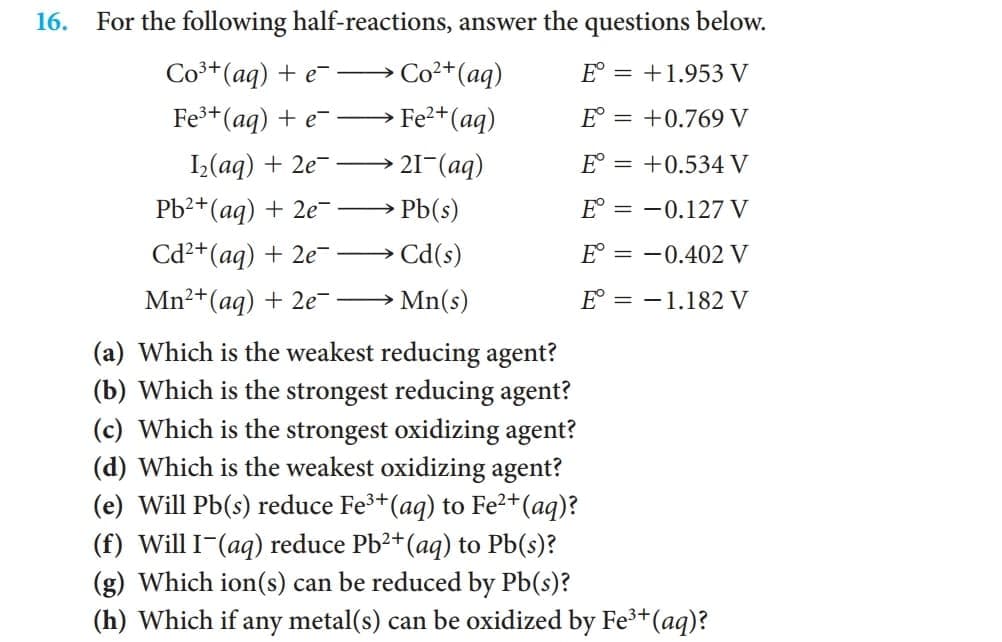16. For the following half-reactions, answer the questions below. Co+(aq) + e- → Co²+(aq) E° = +1.953 V Fe+(aq) + e-→ Fe2+(aq) E° = +0.769 V %3D I,(aq) + 2e--→ 21-(aq) E° = +0.534 V Pb2+(aq) + 2e¯ → Pb(s) E° = -0.127 V Cd²+(aq) + 2e- →Cd(s) E° = -0.402 V Mn2+(aq) + 2e- → Mn(s) E = -1.182 V (a) Which is the weakest reducing agent? (b) Which is the strongest reducing agent? (c) Which is the strongest oxidizing agent? (d) Which is the weakest oxidizing agent? (e) Will Pb(s) reduce Fe3+(aq) to Fe2+(aq)? (f) Will I-(aq) reduce Pb2+(aq) to Pb(s)? (g) Which ion(s) can be reduced by Pb(s)? (h) Which if any metal(s) can be oxidized by Fe3+(aq)?
16. For the following half-reactions, answer the questions below. Co+(aq) + e- → Co²+(aq) E° = +1.953 V Fe+(aq) + e-→ Fe2+(aq) E° = +0.769 V %3D I,(aq) + 2e--→ 21-(aq) E° = +0.534 V Pb2+(aq) + 2e¯ → Pb(s) E° = -0.127 V Cd²+(aq) + 2e- →Cd(s) E° = -0.402 V Mn2+(aq) + 2e- → Mn(s) E = -1.182 V (a) Which is the weakest reducing agent? (b) Which is the strongest reducing agent? (c) Which is the strongest oxidizing agent? (d) Which is the weakest oxidizing agent? (e) Will Pb(s) reduce Fe3+(aq) to Fe2+(aq)? (f) Will I-(aq) reduce Pb2+(aq) to Pb(s)? (g) Which ion(s) can be reduced by Pb(s)? (h) Which if any metal(s) can be oxidized by Fe3+(aq)?
Chemistry: Principles and Reactions
8th Edition
ISBN:9781305079373
Author:William L. Masterton, Cecile N. Hurley
Publisher:William L. Masterton, Cecile N. Hurley
Chapter17: Electrochemistry
Section: Chapter Questions
Problem 26QAP: For the following half-reactions, answer the questions below....
Related questions
Question

Transcribed Image Text:16. For the following half-reactions, answer the questions below.
Co3+(ag) + e-→
Co2+(aq)
E° = +1.953 V
Fe+(aq) + e-→
Fe2+(aq)
E° = +0.769 V
I,(aq) + 2e-
21-(aq)
E° = +0.534 V
Pb2+(aq) + 2e-
Pb(s)
E° = -0.127 V
Cd2+(ag) + 2e- →
→ Cd(s)
E° = -0.402 V
Mn²+(aq) + 2e → Mn(s)
E = -1.182 V
(a) Which is the weakest reducing agent?
(b) Which is the strongest reducing agent?
(c) Which is the strongest oxidizing agent?
(d) Which is the weakest oxidizing agent?
(e) Will Pb(s) reduce Fe+(aq) to Fe2+(aq)?
(f) Will I-(aq) reduce Pb?+(aq) to Pb(s)?
(g) Which ion(s) can be reduced by Pb(s)?
(h) Which if any metal(s) can be oxidized by Fe3+(aq)?
Expert Solution
This question has been solved!
Explore an expertly crafted, step-by-step solution for a thorough understanding of key concepts.
This is a popular solution!
Trending now
This is a popular solution!
Step by step
Solved in 4 steps

Knowledge Booster
Learn more about
Need a deep-dive on the concept behind this application? Look no further. Learn more about this topic, chemistry and related others by exploring similar questions and additional content below.Recommended textbooks for you

Chemistry: Principles and Reactions
Chemistry
ISBN:
9781305079373
Author:
William L. Masterton, Cecile N. Hurley
Publisher:
Cengage Learning

Chemistry
Chemistry
ISBN:
9781305957404
Author:
Steven S. Zumdahl, Susan A. Zumdahl, Donald J. DeCoste
Publisher:
Cengage Learning

Chemistry: An Atoms First Approach
Chemistry
ISBN:
9781305079243
Author:
Steven S. Zumdahl, Susan A. Zumdahl
Publisher:
Cengage Learning

Chemistry: Principles and Reactions
Chemistry
ISBN:
9781305079373
Author:
William L. Masterton, Cecile N. Hurley
Publisher:
Cengage Learning

Chemistry
Chemistry
ISBN:
9781305957404
Author:
Steven S. Zumdahl, Susan A. Zumdahl, Donald J. DeCoste
Publisher:
Cengage Learning

Chemistry: An Atoms First Approach
Chemistry
ISBN:
9781305079243
Author:
Steven S. Zumdahl, Susan A. Zumdahl
Publisher:
Cengage Learning


Chemistry: The Molecular Science
Chemistry
ISBN:
9781285199047
Author:
John W. Moore, Conrad L. Stanitski
Publisher:
Cengage Learning

Chemistry & Chemical Reactivity
Chemistry
ISBN:
9781337399074
Author:
John C. Kotz, Paul M. Treichel, John Townsend, David Treichel
Publisher:
Cengage Learning